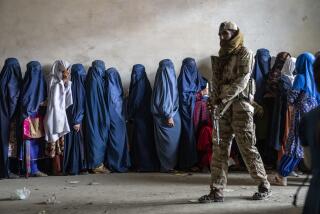Girls Have an Especially Long Way to Go : Women’s forum: In poor countries, the social norm that devalues daughters is rooted in economics; this can be helped.
- Share via
ISLAMABAD, Pakistan — As the U.N. Fourth World Conference on Women opens in Beijing, we look back and see that women have made progress since the last conference held a decade ago in Nairobi. However, we still have a long way to go to eliminate gender discrimination.
The important qualitative difference over the past 10 years is that women’s issues have moved up on the agenda of most developing countries, as well as on the list of priorities of international agencies and donor countries. This convergence of concern has led to significant policy initiatives like the conference’s social action program, which recognizes that female literacy and health are essential prerequisites for social and economic transformation.
In Pakistan, with our history of frequent martial law and the weight of a traditional, male-dominated culture, gender discrimination is an ever-present and often terrifying reality. But it is important to realize that these attitudes are frequently the direct results of crushing poverty: When a family can afford to educate only one child, it is invariably the son who goes to school because he will look after his parents in their old age, while the daughter will get married and go off to her new home. For the same reason, the male child gets precedence over his sister in matters of food and medicine.
Girls thus grow up in an environment where their worth is devalued in their own eyes and in the eyes of society. A basically economic decision has been converted over time into a social norm with all the weight of custom and tradition behind it.
I am sure that the Beijing conference will be a very useful forum where women’s issues and problems will be thoroughly discussed and debated. For governments, NGOs (non-governmental organizations) and individuals, it will be a wonderful opportunity to exchange views and experiences. However, at the end of the day, it will be left to each country to address these problems and issues and to get on with the tough battle to set half their population free.
Let us not lose sight of the fact that, even with the best of intentions, transforming social habits and attitudes is an uphill task. And given the widespread prevalence of poverty and illiteracy in my country, our world is that much harder.
Ultimately, empowerment is attained through economic independence. As long as women are dependent on men, they will face discrimination in one form or another. My government has made a start by diverting scarce funds into vocational training programs and reserving seats for women while recruiting for the civil services. We have taken initiatives like opening a women’s bank to help women entrepreneurs. But I would be the first to recognize that these are only the first steps on the long, hard road to equality. Before we can bring about the political and social emancipation of women, we will first have to ensure that they can stand on their own feet.
We need to focus on tangible efforts to assist women. For instance, women are employed in the garment sector of the textile industry in large numbers. If importing nations increased their purchase of garments, this would directly benefit thousands of women. Grants designed to raise the literacy rates of women would have immense long-term benefits to the recipient nations. We need more tangible assistance and fewer seminars and workshops to analyze women’s problems.
This is not to suggest that I am pessimistic about the outcome of the Beijing conference. On the contrary, I am confident that the discussions and resolutions to emerge from it will serve as a benchmark. We will all have to cooperate if the next century is to witness the final emergence of women as equal partners to men in our joint progress toward a peaceful and prosperous world.
More to Read
Sign up for Essential California
The most important California stories and recommendations in your inbox every morning.
You may occasionally receive promotional content from the Los Angeles Times.













